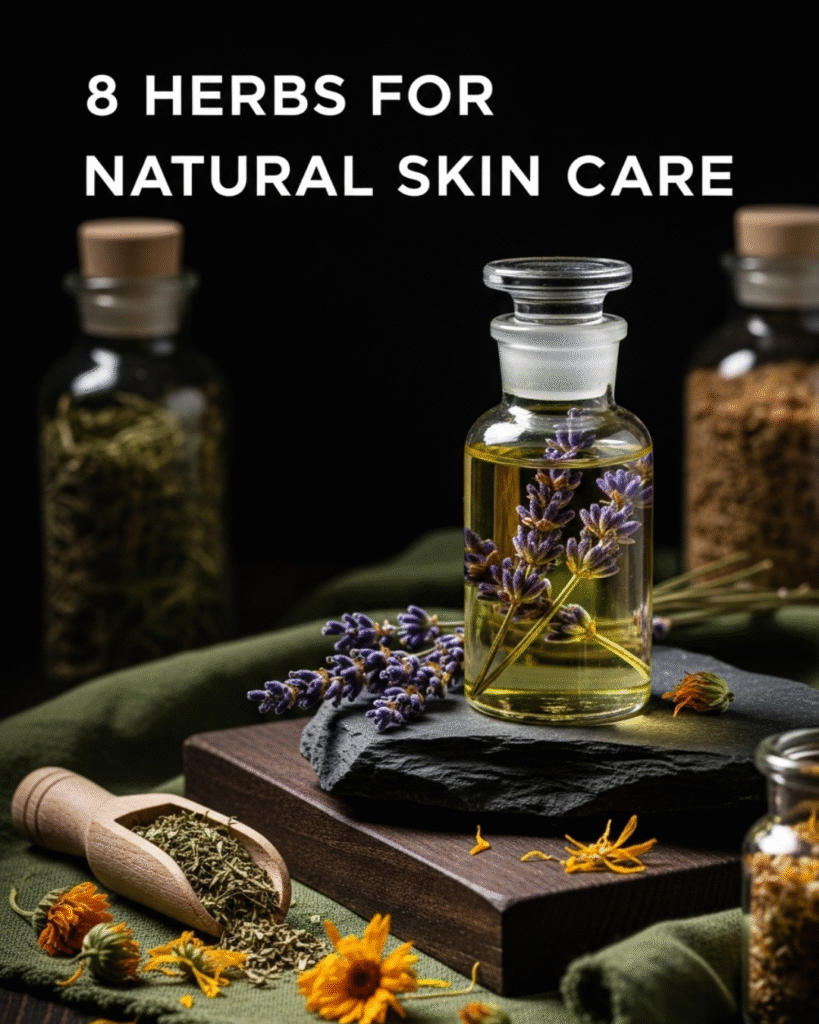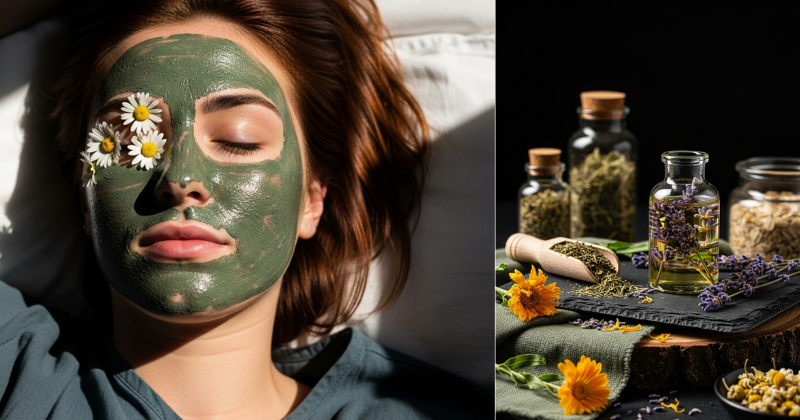Are you seeking a sustainable lifestyle change for your beauty routine, moving away from complex chemicals toward simple, potent botanicals? Harnessing the power of 8 herbs for natural skin care is the key to unlocking healthier, more radiant skin. For centuries, herbal remedies have been used to soothe, heal, and rejuvenate the skin, offering benefits that are often superior to synthetic ingredients. This comprehensive guide will empower you to discover the remarkable properties of these natural skin care powerhouses. We’ll show you how to transform common garden herbs into effective treatments, helping you achieve your glow goals with supportive, evidence-based self-care.
🌿 Foundation First: Why Herbal Skin Care Works
The effectiveness of natural skin care herbs lies in their complex biochemical makeup. Unlike single-molecule pharmaceutical ingredients, herbs contain a synergy of compounds—antioxidants, vitamins, minerals, and volatile oils—that work together to address multiple skin concerns simultaneously.
H3: Building Confidence in Botanical Efficacy
Many people hesitate, believing synthetic ingredients are more potent, but scientific evidence increasingly confirms the power of botanicals. For example, many herbs are rich in polyphenols and flavonoids, powerful antioxidants that combat oxidative stress—the primary cause of premature aging. By using 8 herbs for natural skin care, you are choosing ingredients that address the root causes of skin damage, not just the symptoms.
- Anti-Inflammatory Action: Many herbs possess natural anti-inflammatory properties that help calm conditions like acne, eczema, and rosacea, providing a gentle approach to gradual progress and self-care.
- Vitamins and Hydration: Herbs like Aloe Vera and Calendula are packed with water and vital vitamins (like A, C, and E), offering deep, sustained hydration and cell renewal.
H3: Safety First:Understanding Potency
When switching to natural alternatives, remember that “natural” does not always mean “mild.” Essential oils derived from herbs are highly concentrated and must be handled with care. Always perform a patch test when applying a new herbal preparation to your skin to ensure you don’t have a negative reaction. Start with gradual progress and lower concentrations.

✨ Meet the Powerhouses: 8 Herbs for Natural Skin Care
Let’s dive into the specific benefits of 8 herbs for natural skin care and what makes them essential additions to your regimen.
| Herb | Primary Benefit | Key Actionable Compound | Best Used For |
| 1. Chamomile | Calming & Soothing | Bisabolol, Chamazulene | Sensitive skin, redness, irritation |
| 2. Calendula | Healing & Regenerating | Triterpenoids, Flavonoids | Minor wounds, scars, dry skin |
| 3. Aloe Vera | Hydrating & Cooling | Polysaccharides, Anthraquinones | Sunburn, moisturizing, anti-inflammation |
| 4. Green Tea | Anti-Aging & Antioxidant | Catechins (EGCG) | UV damage protection, firmness |
| 5. Lavender | Balancing & Antiseptic | Linalool, Linalyl Acetate | Acne, relaxation, oil regulation |
| 6. Rosemary | Toning & Circulating | Carnosic Acid, Camphor | Mature skin, oil control, hair growth |
| 7. Turmeric | Brightening & Anti-Inflammatory | Curcumin | Hyperpigmentation, blemishes |
| 8. Witch Hazel | Astringent & Toning | Tannins | Excess oil, toning, pore reduction |
H4: The Antioxidant Champion: Green Tea (Camellia sinensis)
Green Tea is not just a healthy beverage; it’s a profound anti-aging ingredient. It’s loaded with Epigallocatechin Gallate (EGCG), one of the most powerful antioxidants known.
- UV Damage Protection: EGCG has been scientifically proven to help neutralize free radicals generated by UV exposure, assisting the skin in maintaining its natural collagen and elastin. Incorporate it into your morning routine for added environmental defense. (Internal Linking Opportunity: Discover how to make your own “Green Tea Facial Mist for Daily Antioxidant Protection.”)
H4: The Ultimate Healer: Calendula (Calendula officinalis)
Often referred to as the “marigold,” Calendula is perhaps the best herb for skin repair. It contains triterpenoids, which have potent anti-inflammatory properties, and carotenoids, which assist in wound healing.
- Skin Barrier Support: Calendula oil or extract is ideal for soothing damaged skin barriers, minimizing scarring from acne, and calming diaper rash or eczema flare-ups. This makes it an essential herb for sensitive and reactive skin types.
🧴 Step-by-Step Process: Core Methods for Herbal Application
You don’t need a lab to incorporate 8 herbs for natural skin care into your life. The most achievable, cost-effective methods involve infusions and simple extractions.
Core Methods: Making Herbal Infusions and Oils
- Creating Herbal Infused Oil (The Core Method): This is the foundation for using fat-soluble herbs like Calendula or Chamomile.
- Fill a clean glass jar halfway with dried herbs.
- Cover the herbs completely with a carrier oil (like Jojoba, Sweet Almond, or Olive Oil).
- Seal the jar and place it in a cool, dark place for 4-6 weeks, shaking gently daily. This slow method allows the oil to extract the beneficial fat-soluble compounds.
- Strain the oil through cheesecloth into a clean bottle. This oil is now ready to use as a facial oil or body moisturizer.
- Making Herbal Hydrosols (The Toning Method): For water-soluble herbs like Witch Hazel or Green Tea.
- Steep fresh or dried herbs in just-boiled distilled water for 15-20 minutes, like making tea.
- Strain the liquid and let it cool completely.
- Store the resulting herbal “tea” or hydrosol in a spray bottle in the refrigerator. This makes a phenomenal, gentle toner or cooling facial mist.
(Internal Linking Opportunity: Learn the step-by-step guidance for “How to Safely Extract Essential Oils from Home-Grown Herbs.”)
🎯 Advanced Strategies: Customizing Your Herbal Routine
To take your natural skin care to the next level, you must understand how to pair and customize your herbal ingredients for specific results.
H3: Customizing for Age-Defying and Brightening
To maximize antioxidant and regenerative power, focus on combining Green Tea and Turmeric.
- The Brightening Mask: Mix 1 teaspoon of Green Tea hydrosol with 1/2 teaspoon of plain yogurt (for lactic acid) and a pinch of pure Turmeric powder. Apply this mask for 10 minutes. Curcumin (from Turmeric) is scientifically proven to inhibit melanin production, helping to fade hyperpigmentation and sun spots, while the Green Tea protects against future damage.
H3: Calming the Storm: Anti-Inflammatory Blends
For sensitive skin or active breakouts, the soothing properties of Aloe Vera and Chamomile are unbeatable.
- The Soothing Gel: Mix pure Aloe Vera gel with a few drops of a Chamomile-infused carrier oil. This blend provides instant, cooling relief for inflammatory conditions. Chamomile’s bisabolol acts as a powerful, non-steroidal anti-inflammatory, perfectly complementing the rapid healing properties of Aloe Vera polysaccharides.
⚠️ Troubleshooting and Safety: Maximizing Results
Switching to herbal care is a positive step, but sometimes, natural ingredients can still cause issues if used incorrectly.
Featured Snippet Potential: “Can I use essential oils from herbs directly on my skin?”
No, you should never use essential oils from herbs (like pure Rosemary or Lavender) directly on your skin. Essential oils are highly concentrated chemical compounds and must be diluted in a carrier oil (such as Jojoba, Sweet Almond, or your Calendula-infused oil) before application. The general safe dilution rate for facial application is typically $1\%$, which is about 6 drops of essential oil per 1 ounce (30 ml) of carrier oil. Using undiluted essential oils can cause severe skin irritation, sensitization, or chemical burns.
Troubleshooting Your Herbal Preparations
| Issue | Likely Cause | Solution & Preventive Measures |
| Herbal Oil Smells Rancid | Herbs were not completely dry, introducing moisture and bacteria. | Solution: Discard and start over. Prevention: Always use thoroughly dried herbs for oil infusions. |
| Breakouts After Using Oil | Oil is too heavy for your skin type (e.g., using Olive Oil on oily skin). | Solution: Switch to a non-comedogenic oil base like Jojoba Oil or Grapeseed Oil for your infusions. |
| Skin feels tight after toning | Overuse of the astringent Witch Hazel. | Solution: Reduce frequency to once daily, or dilute your Witch Hazel hydrosol 1:1 with distilled water. |
🌟 Maximizing Results: Sustainable Lifestyle Integration
Incorporating 8 herbs for natural skin care into a cohesive wellness routine elevates the experience from mere maintenance to meaningful self-care.
Next Level Tips for Continued Growth and Learning
- Grow Your Own: For the freshest, most potent ingredients, consider planting a small herbal garden with perennial favorites like Lavender and Rosemary. Harvesting your own herbs strengthens your connection with nature and ensures you have a readily available, high-quality supply.
- Internal Support: Remember that skin health starts from within. Green Tea can be consumed daily to bolster internal antioxidant defenses, working synergistically with your topical applications.
- The Power of Steam: Use your herbal hydrosols (like Chamomile or Rosemary steam) over a basin of hot water once a week. The steam opens pores, allowing the gentle compounds to penetrate deeply for detoxification and balancing.
✅ Conclusion: Embrace Your Natural Radiance
You are now equipped with the knowledge to utilize 8 herbs for natural skin care, empowering you to create a supportive, sustainable, and highly effective beauty regimen. By focusing on the powerful properties of herbs like Calendula for healing, Green Tea for anti-aging, and Aloe Vera for hydration, you’ve chosen a path of self-care that is both kind to your skin and the planet.
Embrace this transformative journey! The sustainable lifestyle changes you make today will reward you with vibrant, naturally beautiful skin tomorrow.
